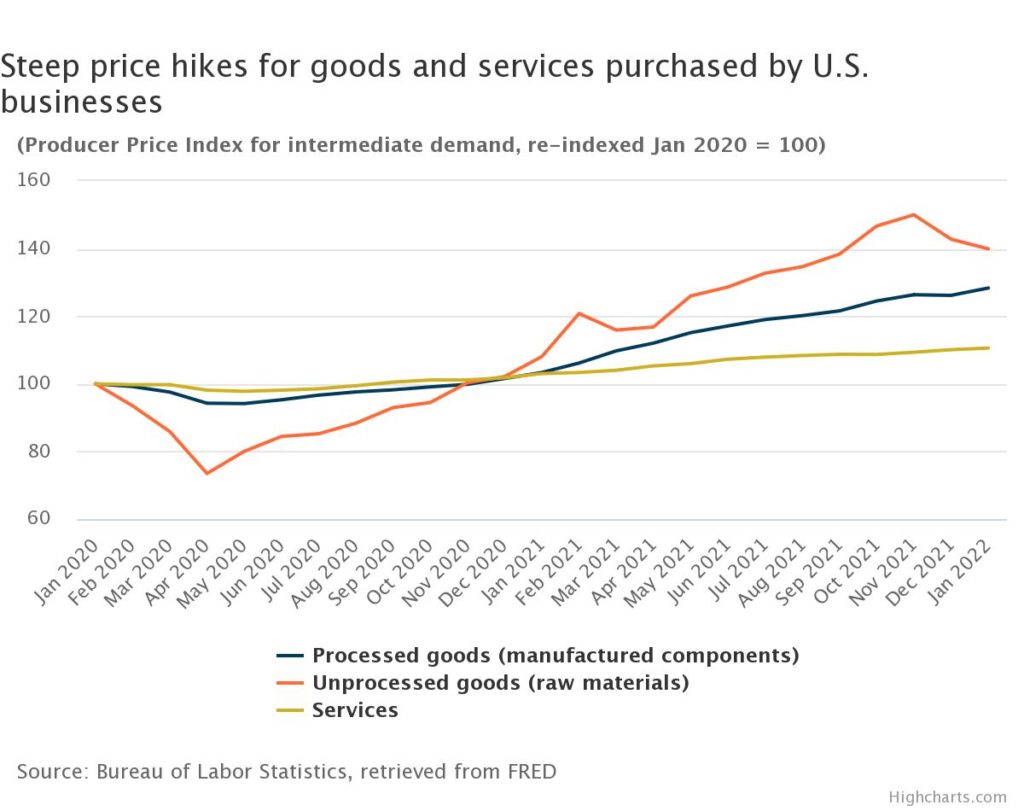A Minneapolis Fed article reinforces an economic point I made last month: higher wages for workers aren’t driving inflation. Nonlabor inputs, like raw materials, are showing far greater price hikes than labor-intensive services:

The pandemic disrupted consumer demand, and manufacturers, beset by their own staffing challenges, are struggling to shift their production to make the stuff we want:
For the construction industry, an increase in online purchasing along with businesses stockpiling supplies to hedge against future shortages have led to a boom in construction of new warehouses and distribution centers. That has contributed to a shortage of steel joists, precast concrete walls, and insulation panels, according to Pete Hayes, president of Menomonie, Wis., based Red Cedar Steel and a speaker at the MCA event.
Another layer addresses manufacturing capacity, which has not caught up with demand. Manufacturers in the Minneapolis Fed survey said that, like other businesses, they, too, are hamstrung by the availability of workers and supplies.
“We import [supplies], which now takes at least three times as long,” a Twin Cities manufacturer reported. “We struggle to get trucks to show up for their pickups. And we are unable to get space on trains or planes.”
At the Wells plant, [concrete plant sales rep Mat] Boie said, labor has been a challenge, with fewer job applicants, some workers not showing up for work, and others quitting. Such challenges are exacerbated when existing workers are exposed to COVID-19 and must quarantine for days, he said [Tran, 2022.03.18].
There may be no amount you can pay some workers to put themselves at unnecessary risk of coronavirus. But the lack of labor that is causing the lack of supply of goods that is causing rising prices suggests that, far from making matters worse, paying better wages would help solve shortages and inflation.
There may be no amount you can pay some workers to put themselves at unnecessary risks of working for The Man. Despair and desperation will always give the underground economy markets for people look for any way to make the pain go away.
The callous denial of most Republicans that capitalism is failing an ever-burgeoning number of Americans falling by the wayside and driving crime rates higher while blaming their own victims will crush this republic faster than they will ever raise wages.
Larry, those with money can afford to deny the failures of capitalism because they can simply buy their way out of any shortcoming that affects them. The wealthy’s house will be built because the wealthy can buy their way to to the top of the construction list. Expensive caviar will be delivered because the profit margin is there — even as potatoes are out of stock in local supermarkets. What the wealthy see as a system working is in fact a system failing far too many, too many who are not chatting about these failures at the country clubs of those living life uninterrupted.
I would also add that any discussion of inflation that does not identify profiteering and price gouging as causes is incomplete at best.
It’s about equity or Maria shrugged, if you will. Just because we’re Democrats doesn’t make us subjects, it makes us powerful: a reverse “Who is John Galt?”
Talent is fleeing red states as Republicans make dystopianism the best feature of their prayers according to WalletHub.
https://wallethub.com/edu/states-with-highest-job-resignation-rates/101077
Well the women in South Dakota are doing fine. USD beat Baylor by 14 to get to the sweet 16. An amazing victory for any Vermintown fans out there.
The higher wages rise, the more unemployment benefits should be scaled back. Perhaps shut down. This society will now, thanks to Mr. President Biden, devolve into those who work for their good money, and those who sit on their butts for less and less free money.
The Gravy Train is for those who put in some elbow grease.
Oh grudz you stinkith alotith. It’s all that gravy and biscuit breakfast. You know absolutely nothing about human nature.
grudz, as the lesson of many decades of study if the nature of humans in the workplace shows, $$$$ is the least effective motivator there is of all the motivational tools available to employers.
Wait, what?
Thanks to a medical industry triopoly South Dakota is again the most lucrative state to practice medicine, nurses’ salaries still surf the bottom yet the state is 22nd in “medical environment” so why isn’t there a regulatory body like the Public Utilities Commission to regulate medical care costs? Because the state is a corporatist tax haven for an exclusive set of Republicans while over $4 trillion languishes in South Dakota banks and trusts.
https://wallethub.com/edu/best-and-worst-states-for-doctors/11376